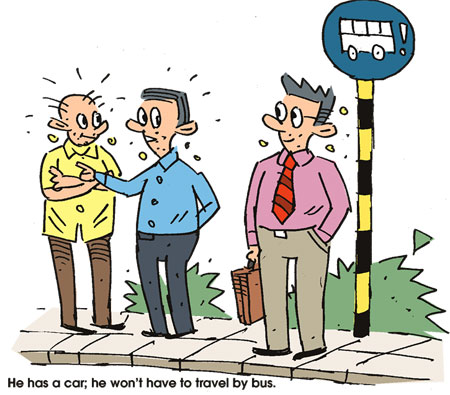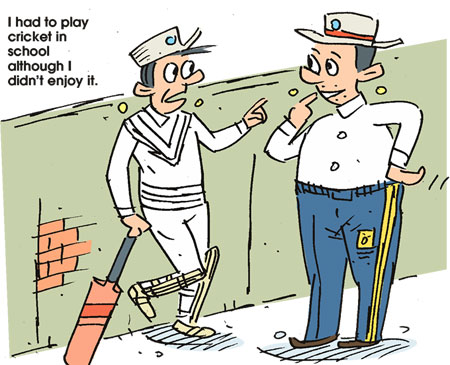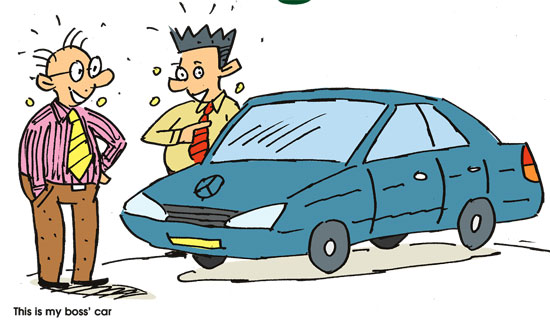|

by R. S. Karunaratne
How to use ‘had to’ and‘will have to’
‘Had to’ and ‘will have to’ are not modals, but they are very useful
in conversation and writing. We use ‘had to’ to indicate the past.
I had to attend tuition classes even on holidays.
We had to learn French before going to France.
Mary had to leave school at 15.
Suramya had to learn mathematics to follow a university course.

I had to play cricket in school although I didn’t enjoy it.
Negatives
Neela didn’t have to pay admission fees.
I didn’t have to learn Chinese to visit China.
We didn’t have to write poems in the literature class.
Nilu didn’t have to apply for leave to attend the conference.
Sam didn’t have to play for the school team as he was ill.
We use ‘will have to’ to indicate the future.
You will have to obtain a passport to visit foreign countries.
She will have to wait for half an hour to meet the principal.
Nayana will have to start school next year.
George will have to give up smoking.
You will have to study hard to pass the examination.
Negatives
I won’t have to come with you tomorrow.
You won’t have to suffer when you go abroad.
Anoma won’t have to wait after school.
He has a car; he won’t have to travel by bus.
I won’t have to work on Sundays.
Question forms
Did you have to learn Latin in school?
Did Mary have to stay at home for three months?
Did Supun have to sit an examination last year?
Did you have to wait a long time for a train?
Did mother have to cook for all the visitors?
[Activity]
Write about the things Eva had to do or didn’t have to do at home on
Sunday. Check your answers with the key.

1. wash clothes
.....................................................
2. listen to the radio
.....................................................
3. cook
.....................................................
4. bake a cake
.....................................................
5. go to school
.....................................................
6. answer the phone
.....................................................
7. sign the attendance register
.....................................................
8. sing and dance
......................................................
9. look after her baby
......................................................
10. feed the baby
......................................................
Key:
1. Eva had to wash clothes.
2. Eva had to / didn’t have to listen to the radio.
3. Eva had to cook.
4. Eva had to / didn’t have to bake a cake.
5. Eva didn’t have to go to school.
6. Eva had to answer the phone.
7. Eva didn’t have to sign the attendance register.
8. Eva didn’t have to sing and dance.
9. Eva had to look after her baby.
10. Eva had to feed the baby.
Match words and meanings
Here’s an interesting way to enrich your vocabulary. Match the words
in Column ‘A’ with the meanings in Column ‘B’. Check your answers with
the key. The first one has been done for you.
[Column A]
B...1. bedmate
.....2. bedridden
.... 3. bedrock
.... 4. bedsore
.... 5. beep
.... 6. beetle
.... 7. befit
.... 8. befriend
.... 9. befuddled
....10. beget
.... 11. begone
... 12. begrudge
... 13. beguile
... 14. behead
... 15. behold
... 16. beige
... 17. bejewelled
... 18. belabour
... 19. belated
... 20. beleaguered
... 21. belfry
... 22. belie
... 23. belle
... 24. bellicose
... 25. belligerent
[Column B]
A. to cause to make a short loud sound
B. somebody you share your bed with
C. cause
D. a beautiful woman
E. to show something to be false
F. the tower of a church where bells are hung
G. an insect with a hard shell-like back
H. troubled by somebody or a situation
I. coming later than expected
J. to explain something more than necessary
K. a wound caused by having to lie in bed for a long time
L. wishing to fight or start a war
M. wearing a lot of jewellery
N. to allow or give unwillingly
O. having to stay in bed because of illness
P. to be suitable or right
Q. a pale creamy brown colour
R. the hard area of rock in the ground
S. go away
T. to cut off somebody’s head
U. to see or look at
V. wishing to fight or argue
W. persuade in order to deceive
X. confused
Y. to be friendly towards somebody
Key:
2.O 3. R 4. K 5. A 6. G 7. P 8. Y 9. X 10. C 11. S 12. N 13. W 14. T
15. U 16. Q 17. M 18. J 19. I 20. H 21. F 22. E 23. D 24. L 25. V
Starters:
Possessive forms in English

We make possessive forms by adding an apostrophe ( ‘ ) to a singular
noun ending in ‘-s.’
Socrates’ philosophy is valid even today.
Have you read Charles Dickens’ novels?
I'm living in Chris’ house.
Do you agree with Hans’ decisions?
This is my boss’ car.
However, many writers prefer to
add an ‘s to names ending in ‘s.’
Dickens's novels were popular some time ago.
Socrates's writings are very useful.
Have you read Keats's poetry?
She attended the service at St Augustus's church.
Iris's car is very expensive.
We make possessive forms by adding is to singular nouns.
You will find the cat's milk in the refrigerator.
You must listen to the student's views.
Mary's mother died in Canada.
Laura's sisters are younger than her.
This year's International Book Fair was held at the BMICH.
We make possessive forms by adding ‘s to plural nouns which do not
end in ‘s.’
Are you interested in men's fashions?
This is a good children's play.
The police's actions were condemned by the public.
Where is the Women's Bureau?
Oxen's services were used in the past to pull loads on farms.
We add ‘s to whole phrases and compound nouns to make them possessives.
The people next door's cat is a nuisance.
Sam and Mary's new apartment is very comfortable.
This is my sister-in-law's bag.
For fixed expressions we add a single apostrophe. However, this is
becoming optional.
For goodness’ sake, do your job properly.
Or
For goodness sake, do your job properly.
Sometimes we use possessives without a noun following them.
I'll meet you at the doctor's.
We're staying over at Silva's.
We use apostrophes when referring to firms, shops and businesses.
However, many establishments drop the apostrophe.
I bought my television at Stanley's (or Stanleys)
We add ‘s’ to indefinite pronouns.
One's loyalty should be to one's country.
This must be somebody's pen.
Don't worry. It's nobody's responsibility.
Why did you enter someone else's room?
They share each other's secrets.
We do not use an apostrophe for possessive pronouns ending in ‘s.’
This is his.
These are theirs.
Which is yours?
Form adverbs from nouns
Words often come in families. You can expand your vocabulary by
becoming familiar with these word families. We give you 25 nouns in
Column ‘A.’ Write the relevant adverbs in Column ‘B.’ Check your answers
with the key.
[Column A] [Column B]
1. extreme ..............
2. fact ..............
3. failure ..............
4. fairness ..............
5. faith . .............
6. familiarity ..............
7. fame .............
8. fashion ..............
9. fault ..............
10. fear ..............
11. final ..............
12. firmness ..............
13. fish ..............
14. fix ..............
15. flat ..............
16. force ..............
17. forgetfulness ..............
18. formality ..............
19. fortune ..............
20. freedom ..............
21. frequency ..............
22. freshness ..............
23. fright ..............
24. fruit ..............
25. generalisation ..............
Key:
1. extremely 2. factually 3. unfailingly 4. fairly 5. faithfully 6.
familiarly 7. famously 8. fashionably 9. faultlessly 10. fearfully 11.
finally 12. firmly 13. fishily 14. fixedly 15. flatly 16. forcefully 17.
forgetfully 18. formally 19. fortunately 20. freely 21. frequently 22.
freshly 23. frightfully 24. fruitfully 25. generally |

